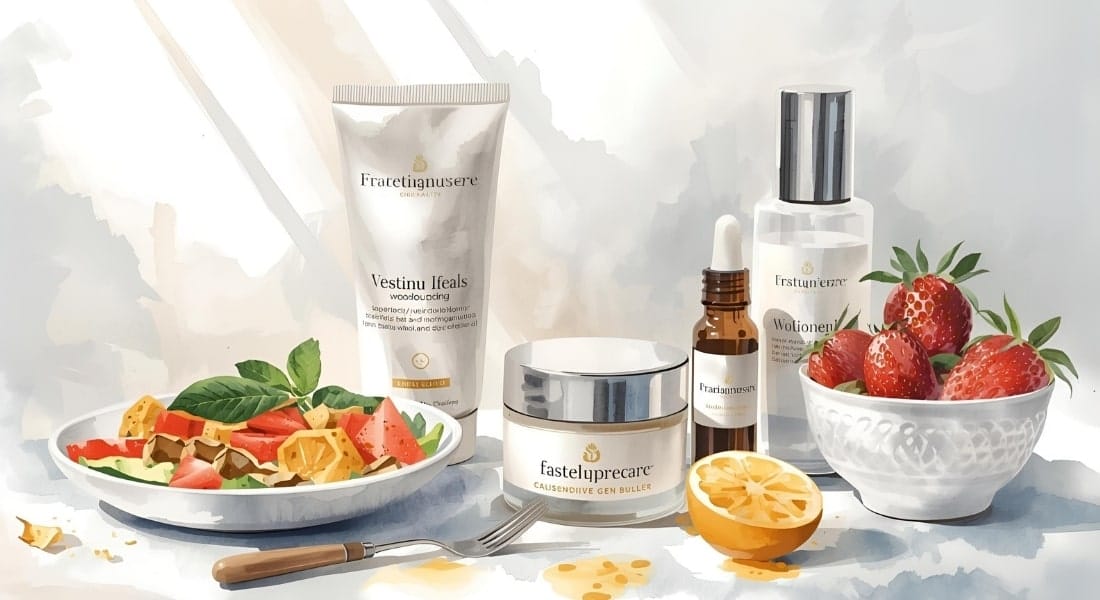For centuries, people have debated whether what we eat directly causes acne. From chocolate to fried foods, countless culprits have been blamed for pesky breakouts. This has led to a great deal of confusion, with many people cutting out entire food groups in the hope of achieving clear skin, often without success. The question remains: can diet cause acne? The answer, as science has shown, is more nuanced than a simple yes or no.
While diet is not the sole cause of acne, a growing body of scientific evidence suggests a strong acne and diet connection. Certain foods can influence the underlying biological processes that contribute to breakouts, such as inflammation and hormone production. However, diet is just one piece of a much larger puzzle that includes genetics, hormones, stress, and, most importantly, a proper skincare routine. This article will separate fact from fiction and provide you with the real truth about how food impacts your skin, along with evidence-backed skincare for acne-prone skin solutions from Aakaar Medical Technologies Ltd.
What is Acne? The Basics
Before we dive into the dietary connection, it’s crucial to understand what acne is and its primary causes. Acne Vulgaris is a common skin condition that occurs when hair follicles become clogged with oil and dead skin cells. This creates a perfect environment for a specific type of bacteria, Propionibacterium acnes, to flourish. The body’s immune response to this bacteria and the clogged follicle leads to inflammation, resulting in the characteristic red bumps, pimples, and cysts associated with acne.
The key factors that influence this process are:
- Excess Sebum Production: Hormones, particularly androgens, can stimulate the sebaceous glands to produce too much oil.
- Follicle Clogging: An overproduction of skin cells can lead to clogged pores.
- Bacteria: The presence of acne-causing bacteria.
- Inflammation: The body’s inflammatory response to the clogged follicle and bacteria.
While these are the main drivers, lifestyle factors like stress, genetics, and, as we will explore, diet can all play a role in influencing these core processes. The simple fact is that acne is a complex condition with multiple contributing factors, meaning no single food or product is a magic bullet.
Diet and Acne: What Science Says
The concept that foods that cause acne is not a myth, but it’s often misunderstood. Modern research has moved past anecdotal evidence to focus on how specific dietary components can influence hormones and inflammation in the body, thereby impacting acne. The two biggest dietary culprits identified by scientific studies are high-glycemic foods and dairy products.

The Glycemic Index
The glycemic index (GI) measures how quickly a food raises your blood sugar. High-GI foods, such as white bread, sugary snacks, potatoes, and sodas, cause a rapid spike in blood sugar. This triggers the pancreas to release a large amount of insulin. High insulin levels can increase the production of androgen hormones, which in turn stimulates sebum production and can lead to inflammation. This link suggests a direct physiological pathway for how high-sugar and refined carbohydrate diets may worsen acne.
The Dairy Connection
The link between dairy and acne is also supported by multiple studies. Dairy products, particularly skim milk, contain hormones and growth factors that can stimulate oil glands and promote inflammation. The growth factor IGF-1 (Insulin-like Growth Factor-1), which is present in milk, is known to have a strong link to acne. However, not all dairy is created equal; fermented products like yogurt and kefir, which contain probiotics, may have a less inflammatory effect.
It is important to clarify that dietary changes can influence acne but are not the sole cause. For many, making dietary adjustments can be a powerful tool for management, but it should always be part of a holistic approach that includes a targeted skincare routine.
Foods That May Trigger Acne
While research is ongoing, certain food groups consistently appear in studies as potential acne triggers for some individuals. If you are struggling with breakouts, it may be beneficial to monitor your intake of these items.
- Dairy Products: As mentioned, milk and other dairy products may contribute to breakouts due to their hormonal content.
- High Glycemic Foods: Foods like sugar, white rice, pasta, white bread, pastries, and soda can all cause a rapid spike in blood sugar and insulin, leading to an increase in inflammation and oil production.
- Fast Food and Fried Foods: These foods are often high in refined carbohydrates and unhealthy fats, both of which can lead to inflammation throughout the body. The link is more to the inflammatory properties of these foods, rather than the “greasiness” itself.
- Excess Whey Protein: Whey protein, a common supplement for athletes, is derived from milk. Like other dairy products, it can trigger an increase in insulin and IGF-1, potentially leading to breakouts.
While adjusting your diet can be helpful, it’s not a complete acne treatment. A comprehensive routine is crucial. At Aakaar, we offer professional skincare for acne-prone skin designed to target acne at its source. Products like etrelume Acnecidol Exo are formulated to address acne-prone skin with advanced, modern ingredients. For your daily cleansing routine, using a gentle yet effective product like TUBELiTE akneklenz is essential to remove impurities without stripping the skin. For those with oily and acne-prone skin, a daily cleanser like Lytec Klense helps control sebum while maintaining skin’s balance.
Foods That May Help Clear Skin
Just as some foods can trigger acne, others can work to fight inflammation and support clear skin. A diet rich in anti-inflammatory, antioxidant, and nutrient-dense foods can have a positive impact on your skin’s health. Think of this as the best diet for acne free skin.
- Omega-3 Fatty Acids: Found in foods like salmon, mackerel, chia seeds, and walnuts, Omega-3s are powerful anti-inflammatory agents that can help calm acne and reduce redness.
- Zinc-Rich Foods: Zinc plays a vital role in regulating oil production and controlling inflammation. Good sources include pumpkin seeds, legumes, and lean meat.
- Antioxidants: Vitamins A, C, and E are potent antioxidants that fight free radical damage and reduce inflammation.
- Vitamin A: Carrots, sweet potatoes, and spinach are rich in beta-carotene, which the body converts to Vitamin A.
- Vitamin C: Found in citrus fruits, bell peppers, broccoli, and berries. Vitamin C for skin is crucial for collagen production and for fading dark spots.
- Vitamin E: Nuts, seeds, and leafy greens are excellent sources.
- Hydrating Foods: Foods with high water content, like cucumber, watermelon, and celery, help to maintain skin hydration and overall health. Adequate hydration for skin health is just as important as topical moisturizers.
To complement these dietary changes, a targeted skincare routine is essential. For daily hydration, etrelume 2.1% Pure HA++ provides high-quality hyaluronic acid for hydration, helping to plump the skin and strengthen the moisture barrier. For a powerful antioxidant boost, Lytec Nano C20 is a Vitamin C serum that brightens the skin and helps fade post-inflammatory hyperpigmentation. Lastly, to ensure your skin remains intensely hydrated and supple, a product like Lytec HYDRA can be integrated into your routine.
Lifestyle & Skincare Along with Diet
A clear complexion is the result of a multifaceted approach. While managing your diet is a great start, a holistic strategy that includes lifestyle adjustments and a medical-grade skincare routine is necessary for comprehensive results.

- Stress Management: Chronic stress can lead to an increase in cortisol, a hormone that stimulates sebum production and inflammation. Incorporating stress-reducing activities like meditation, yoga, or exercise can have a profound positive impact on your skin.
- Adequate Sleep: During sleep, your body repairs itself. A lack of sleep can disrupt hormone balance, leading to increased stress and inflammation.
- Exercise: Regular physical activity improves blood circulation, which helps nourish skin cells and carry away waste products.
In addition to these lifestyle changes, your daily skincare routine and professional treatments are arguably the most effective way to manage acne.
- Sun Protection: The sun’s UV rays can exacerbate acne inflammation and worsen the appearance of acne marks and scars. Using a high-quality, non-comedogenic sunscreen is a non-negotiable step. For this purpose, Lytec SHELL SUNSCREEN is an excellent best sunscreen for acne-prone skin that provides broad-spectrum protection without clogging pores.
- Professional Skin Care Treatments: For persistent or severe acne, professional intervention is often necessary. Professional skin care treatments for acne can effectively manage stubborn breakouts and their aftermath. For a truly transformative professional treatment, EXOLUXE: Exosome Medifacial Kit represents a cutting-edge approach to cellular rejuvenation. For addressing acne marks and dullness, a professional peel like Theraderm AHA Kojic Acid Peel can provide deep exfoliation and clarify the skin.
Myths vs. Truth About Diet and Acne
Separating myth from truth is crucial for a productive conversation about does food cause acne.
- Myth: Eating chocolate will always cause acne.
- Truth: The link is not to chocolate itself, but to the sugar and milk content. Dark chocolate with high cocoa content and minimal sugar is unlikely to have the same effect as a sugary milk chocolate bar.
- Myth: Greasy food directly clogs your pores.
- Truth: The oil from fried food does not travel through your bloodstream to clog your pores. The connection is indirect; these foods often contain unhealthy fats and refined carbs that can contribute to systemic inflammation and influence hormone levels.
- Myth: Just change your diet and your acne will go away.
- Truth: Diet is a contributing factor, but it’s not the only one. Genetics, hormones, lifestyle, and a proper skincare routine are all critical. Focusing on one aspect and ignoring the others is a major reason why many people fail to get clear skin.
When to See a Dermatologist
If you have severe, cystic, or persistent acne that does not respond to dietary changes and a consistent home skincare routine, it is time to consult a dermatologist. A professional can provide a correct diagnosis and recommend powerful prescription-grade treatments.
Aakaar offers a range of advanced solutions that are exclusively for professional use, such as MELINE 01 ID for hyperpigmentation or Theraderm Biopeptide Rejuvenation Serum for skin rejuvenation. These professional skin care treatments for acne are potent tools for a dermatologist to help you achieve your skin goals.
Diet and Skincare: The Complete Solution

The answer to the question, “can diet cause acne?” is that while diet is not the sole cause, it plays a significant role in influencing the health of your skin. By understanding the connection between high-glycemic foods, dairy, and inflammation, you can make informed dietary choices that support a clearer complexion. However, a holistic approach is key.
A truly effective strategy for achieving clear skin combines a balanced diet with a dedicated and consistent skincare routine and a healthy lifestyle. We invite you to explore Aakaar Medical Technologies Ltd’s range of advanced skincare solutions to find products that are scientifically formulated to target acne and its related concerns. By making smart choices in both your diet and your skincare, you can finally take control of your skin’s health.

